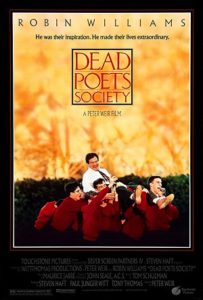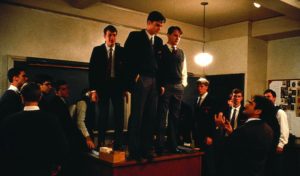 Do you remember the good old days back when Robin Williams was still around? Many of his movies are remembered for being not only funny (Aladdin, Mrs. Doubtfire), but also heart-warming and uplifting (Good Will Hunting, Awakenings). His kind and energetically goofy demeanor have had a meaningful impact on many people both before and after his tragic passing. Well, recently I took a trip back to that magical time through the film Dead Poets Society.
Do you remember the good old days back when Robin Williams was still around? Many of his movies are remembered for being not only funny (Aladdin, Mrs. Doubtfire), but also heart-warming and uplifting (Good Will Hunting, Awakenings). His kind and energetically goofy demeanor have had a meaningful impact on many people both before and after his tragic passing. Well, recently I took a trip back to that magical time through the film Dead Poets Society.
The movie came out in 1989 and stars Ethan Hawke and Robert Sean Leonard as Todd and Neil, two students at Welton Academy, a prestigious boy’s preparatory school. Neil faces a controlling father, and Todd struggles to find self-confidence due to living in his Welton valedictorian brother’s shadow. However, Robin Williams’ eccentric English teacher, John Keating aims to buck the trend and encourage his students to seize-the-day by thinking for themselves. After this, the movie does every single thing you think it will. But, because Peter Weir (The Truman Show, Witness) is directing this, the movie is so classy that I don’t even care. The movie still hits your right in the feels when it wants to.
But, what does seizing the day mean? The film seems to suggest there are right and wrong ways to do it. Neil takes it as encouragement to pursue his dream to become an actor; Todd is challenged to embrace being himself, another boy is able to pursue a girl he would never have had the courage to approach otherwise. However, one kid seems to take it as an excuse to break rules and chase girls. Sometimes seizing-the -day can lead to foolish, even harmful choices, if it is not done thoughtfully. The movie touches on this, but perhaps misses an opportunity to play with it further.
 Keating’s inevitable clash with the school administration also suggests a conflict between two styles of education. It seems that Keating genuinely loves his students, he gets to know them individually, but he doesn’t really care about how much stuff they learn, just that they grow. The rest of the administration wants students to work and learn. But do they really care or do they see the boys as potential trophies on an education-based display stand?
Keating’s inevitable clash with the school administration also suggests a conflict between two styles of education. It seems that Keating genuinely loves his students, he gets to know them individually, but he doesn’t really care about how much stuff they learn, just that they grow. The rest of the administration wants students to work and learn. But do they really care or do they see the boys as potential trophies on an education-based display stand?
Interestingly, the movie doesn’t really leave you with a sense of closure about either issue. The movie drops hints, but it doesn’t come out and hand us a manual on proper day-seizing technique. The other teachers don’t cornily come around to Keating’s side at the end and there is little sign that Welton will be changed dramatically. We are left with a bit of a question. Maybe it’s up to the viewer to think for ourselves, as Keating tells the boys, and seize-the-day with compassion and creatively. That’s clever; I like it when a movie treats me like I have a brain.


